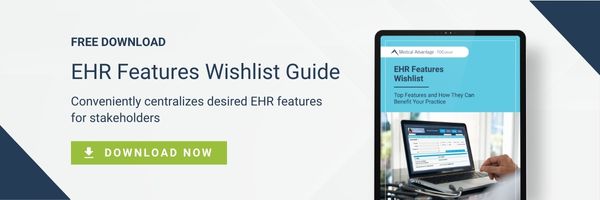Working in a physician’s office for over 12 years, I heard a lot of patients express concerns about electronic health records. Many patients wanted to know if their data was secure, and what would happen if the computer system crashed.
Of course, providers and office staff also have significant concerns about EHR systems, and rightly so. Even after several years of implementing and optimizing these systems, there are many challenges to overcome, including patient safety risks. EHR-related issues were ranked number one on the ECRI Institute’s list of the Top 10 Patient Safety Concerns for Healthcare Organizations in 2015, 2016 and 2017, and remained in the top five for 2018.
Here are a few of the common challenges related to EHR systems that can impact patient safety:
- Patient identification issues.
- Incorrect or missing data in the EHR system.
- Inadequate test result reporting and follow-up.
- Alarm fatigue from staff clicking through too many screens or alerts.
- A disconnect between EHR system configuration and office workflows.
- Insufficient training for providers and office staff.
EHRs have proven to be safer and more efficient than paper charts, which is why all of these issues can and do occur. EHR systems have also been the subject of research that suggests they do not pose a risk to patients as a whole. Harvard researchers found that EHR systems did not significantly impact the number of reported patient safety events or mortality rates in 17 hospitals. The study included hospitals with both comprehensive and basic EHR systems, organizations with brand new EHRs, and those that had switched from one EHR vendor to another. After looking at 30-day mortality rates, 30-day readmission rates, and the AHRQ’s PSI-90 patient safety composite score as indicators of quality, the researchers found no substantial changes in any of the major measures across the study population.
Benefits of EHR Systems
Despite the many challenges that come with EHR systems, there are also many benefits to providers, office staff, and patients. Sometimes it is helpful to remind ourselves of these benefits and how far we have come in the last ten years.
Access to Patient Data from Anywhere
One of the main benefits of an EHR system is that providers can access a patient’s chart from anywhere, at any time. On-call providers working after hours can log into the EHR system to view a patient’s history, current medications, and recent test results. All of this can improve patient safety by providing the necessary information to make an accurate diagnosis and treatment recommendations.
Enhances Data Sharing Among Providers
EHR systems also allow for more seamless sharing of patient data between healthcare providers so that everyone has access to the same information in real-time. This is nearly impossible in offices that still use paper charts, fax, or email communication.
Reduces Repeat Testing and Procedures
Maintaining all of a patient’s data in a single place can help to reduce the ordering of unnecessary tests and procedures. This is especially true when data is shared between the primary care provider and a hospital system or emergency department. An EHR system allows a clinician to access all of a patient’s historical information. This means that they are able to see how many different specialists have worked with their patients and what drugs each provider has prescribed in certain cases.
Prevents Medical Errors
Another benefit of having all of the patient’s information in a single location is that it can prevent medical errors. For example, some EHR systems will help flag potential conflicts when physicians are ordering a medication for a patient that may interfere with another part of his or her regimen.
Less Time Spent on Paperwork
When implemented correctly, an EHR can also make day-to-day work activities more efficient. The average physician spends about eight hours per week on paperwork. An EHR system can reduce that number to less than two hours per week, leaving physicians with additional time to focus on patient care.
Fewer Malpractice Claims
If malpractice claims are a measure of patient safety, then EHR systems provide a distinct advantage. A study from Harvard Medical School found that the rate of malpractice claims for physicians using an EHR system was one-sixth of the rate of physicians who did not use an EHR system.
While there continues to be significant debate about the impact of EHR systems on patient safety, there is a lot of evidence to show the effectiveness of EHR systems. With 62 percent of physicians reporting a positive perception of their EHR system, one could argue that at least we are headed in the right direction. Many times, it is not the EHR system itself, but the implementation of the system that causes headaches and challenges for physicians and office staff. No matter where you come down in the patient safety debate, it seems that EHR systems are here for the long haul. By investing in EHR optimization and continually seeking to improve your office workflows, you can have a positive impact on patient safety and quality of care.
Medical Advantage Can Help
Comparing, selecting, and implementing EHR systems is one of the most important things a practice can do for clinical and financial success – but it is also one of the most difficult. Medical Advantage’s EHR consultants have been helping medical organizations navigate the EHR landscape for decades and with a track record of success.
Our consultants work alongside clients both virtually and at the point of care to understand their practice’s needs, make recommendations, and assist throughout the process both before, during, and after go-live. To find out more, or for a free consultation, contact one of our EHR consultants today.






